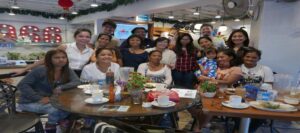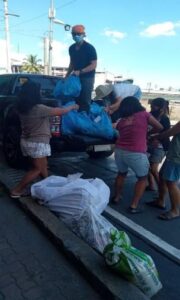
Escolta Santa Cruz District
Escolta, Manila
Collective practices through the modalities of art: Neighborhoods as assemblies
Emerging Issues
The proposed project aims to realize a ‘workshop caravan’ in partnership with art organizations and artist collectives. It will explore how neighborhoods are reconfigured through acts of solidarity; a circumstance necessitated by the recent crises the pandemic has wrought.

Neighbourhood-Community-City-State Relationships
The city-wide lockdown during the pandemic aggravated the living conditions of the homeless women and itinerant vendors in Escolta with whom the SEANNET Manila team had worked during the first phase of the SEANNET research. A few of them have achieved small progress (renting a home, having a cart for the goods they sell, and driving motorbikes for a living), over the years of our being acquainted. Able to eke out meager incomes before the pandemic, their capacity to earn a living was recently drastically curtailed. Some of them relied on assistance from the local government, but with the rising number of poor and homeless people in Metro Manila not all of them benefited from social aid from the state. The city government is bogged down by bureaucracy and the circuitous channels through which the provision of social aid passes. SEANNET Manila team experienced this when the team solicited help from the Manila City government and the local barangay for our women partners: they had to abide curfew restrictions and the lack of coordination resulted to them not receiving the food packs promised by their barangay, These bureaucratic policies is also evident in the way the pandemic task force of the national government oversees implementation of policies, and the manner it trickles down to local city governments and further on, to local barangays; the smallest political unit in the Philippines.
Relevance to SEANNET Collective

During the early days of the lockdown, the Manila research team helped mobilise the sharing of food packs to the women partners in Escolta, which was possible through an online campaign by civil society groups. While the food packs will tide them over for a few days, SEANNET Manila team know that a regular provision of aid may not be sustainable. The initial themes the SEANNET Manila team is interested to explore in the second phase of the SEANNET project include food sustainability and food production in cities; displacement, gentrification and reclamation of neighborhood city spaces; and livelihood security. As such, for this phase the Manila team considers real world circumstances and ways the team can engage the community partners through pragmatic means. As before, SEANNET Manila will continue to explore the modalities inherent to art to engage community partners in our plan to bring on board art organizations and artist collectives both in the Philippines and Southeast Asia.
Research Focus and Proposed Methodology
The Manila research team is keen to conceptually explore new configurations of neighborhoods; one that extends well beyond the boundaries of space and associations with property. Neighborhoods themselves can be activated as ‘assemblies’: which Weibel and Latour (2007) define as “types of gatherings which are not political in the customary sense, but which bring a public together around things.” In turn, publics arise from “new issues, for each new matter of concern.” Assemblies can become important arenas where publics engage with crucial questions of representation.
The Manila team proposes techniques of mediation centered on art: participatory, immersive, and engaged practices that define the “artwork as a practice of service”; and platforms that continue to explore questions relevant to our neighborhood communities. These will primarily consist of a workshop series centered on interaction and participation. We will experiment whether learnings from the workshop modules can be brought from one neighborhood to another, with the goal of sharing approaches and practices across members of the network. Prior the workshops, documentation, field observation, interviews and inception workshops will be carried out. The exchanges will hopefully benefit pedagogy in the disciplines of humanities, architecture and planning.

